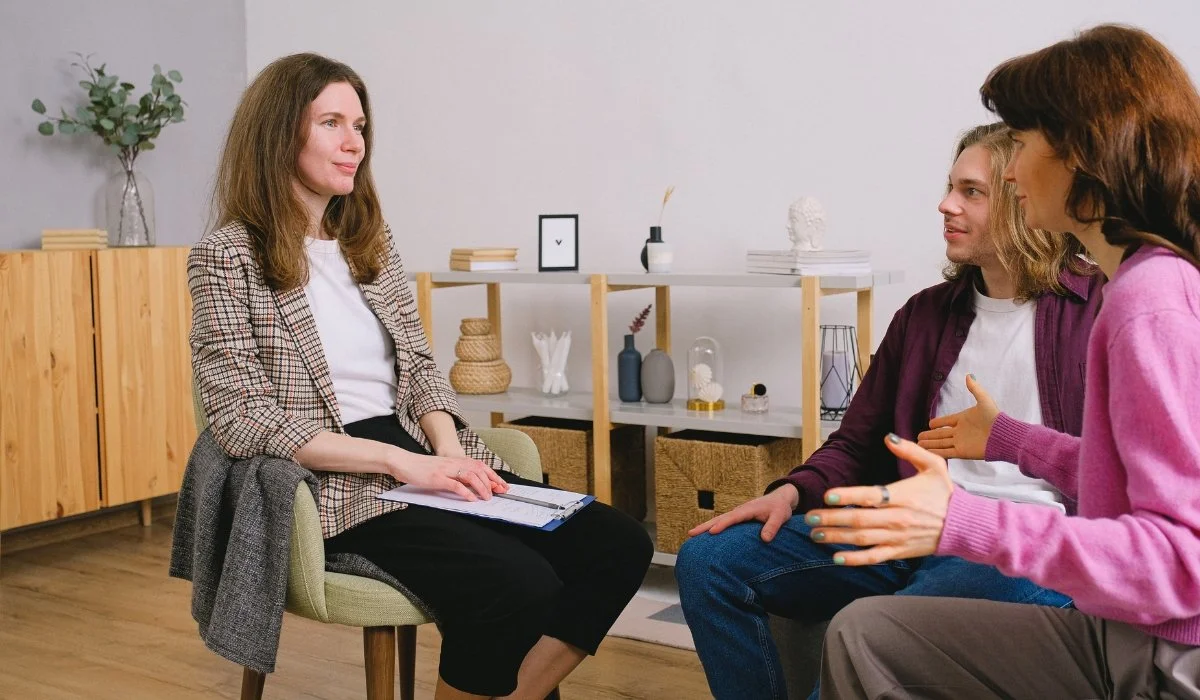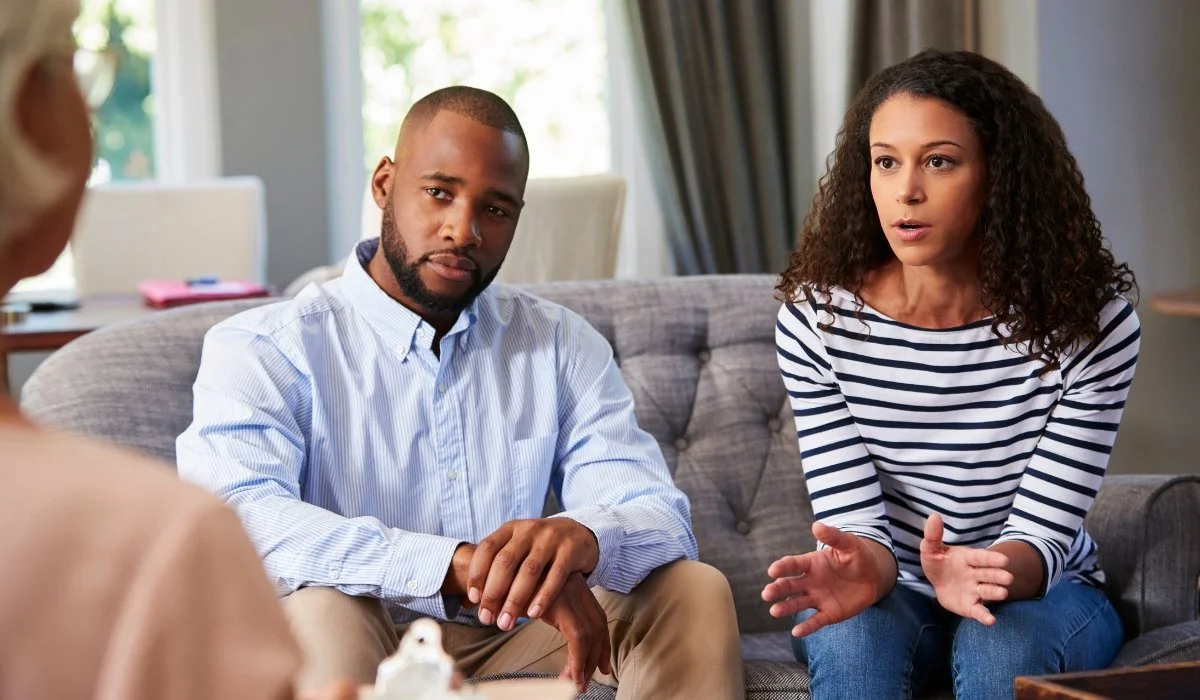In today’s digital age, more couples are turning to online marriage counseling as a convenient alternative to traditional therapy. But how effective is virtual counseling in resolving relationship issues?
From communication struggles to emotional disconnects, let’s explore the benefits and key considerations of virtual therapy to help you decide if it’s the right path for your relationship.
Understanding Virtual Couples Therapy
Virtual couples therapy means counseling over the internet for partners who want to improve their relationship. It uses video conferencing to connect therapists and clients from different places. This kind of therapy offers some clear benefits:
Access: You can reach experts like Emotionally Focused Therapists (EFT) who might not be near you.
Easy scheduling: No travel needed, so it fits better with busy lives.
Comfort: Talking from home often helps couples open up more.
This way of counseling is flexible and can fit into almost any schedule.
The Effectiveness of Virtual Couples Therapy
Virtual couples therapy is getting more popular as a flexible option. Studies show that, for many couples, virtual therapy gives similar therapeutic outcomes to in-person sessions. Telehealth mental health services help improve how couples talk, solve problems, and get closer.
What research tells us:
Virtual therapy works well for most couples.
Online sessions help improve communication.
Couples can build stronger bonds with virtual support.
This way of therapy makes it easier for people to get help without leaving home.
Virtual Therapy vs. In-Person
How does online vs in-person couples therapy compare? Research finds small differences if done right. Here's what they saw:
Both improve communication skills equally.
Therapists and clients build a strong bond either way.
Online therapy may have slightly more dropouts due to tech issues, not because clients dislike it.
The main point: both methods work well when using secure video tools made for privacy and ease.
When Virtual Therapy Is As Effective As In-Person
Virtual couples therapy works best when these things happen:
Good Fit: Couples ready to work together see results no matter where therapy happens.
Strong Therapist-Client Relationship: Therapists trained for online sessions build trust even without meeting face-to-face.
Stable Technology Setup: Good internet helps keep sessions smooth and distraction-free.
If these are in place, virtual sessions can feel just as real and helpful as in-person ones.
The Pros of Virtual Couples Therapy
Virtual couples therapy has become a proven option for many couples. It helps people get support without leaving home. This type of therapy offers some clear benefits that make counseling easier and more effective than in-person visits.
Accessibility and Convenience
Online counseling makes therapy more accessible. It breaks down geographical barriers. Couples can see therapists who aren't nearby. This matters a lot for people in rural areas or small towns with few local options.
Scheduling gets easier with teletherapy. Couples find times that fit busy work days or family care. No need to worry about travel or traffic anymore. This convenience helps couples stick to their sessions better.
Comfort and Safety of Home Environment
Couples often feel more comfortable in their own homes. Therapy from a private space creates psychological safety. People can open up more when they feel safe and relaxed.
The virtual setup also cuts down social pressure from visiting clinics. Most platforms keep everything private and secure. So, the therapy stays confidential.
Overcoming Geographical Barriers
Online counseling helps close the digital divide in therapy access. It works well for rural couples or those who have trouble traveling far for help.
Though a good internet is important, technology keeps improving in many areas. Video calls remove long trips and limited local choices. This way, more people can get couple's therapy over video call when they need it.
Is Virtual Couples Therapy Right for You?
Virtual couples therapy works well for many people. It fits busy professionals who don't have time to meet in person. It helps couples in rural areas where therapy options are limited. Sometimes, partners want specific therapy styles not found nearby. Online marriage counseling can be just as effective as face-to-face when both people stay committed.
If you and your partner have packed schedules or live far apart, virtual sessions offer flexibility. You don't need to sacrifice quality to get help. Also, you can access special methods like Emotionally Focused Therapy (EFT) online. But, you should think about whether virtual therapy suits your needs before jumping in.
Types of Issues Virtual Marriage Counseling Address
Virtual marriage counseling can help with many problems:
Affair Recovery Counseling: Guides couples after cheating to rebuild trust.
Divorce Adjustment Therapy: Helps deal with feelings during separation.
Communication Improvement: Teaches clearer talking and listening skills.
Emotional Support Online: Offers comfort during tough times or changes.
These ways work well online because they focus on talking and feelings more than physical presence.
Preparing for Your First Session
Test your internet first.
Find a quiet spot with no interruptions.
Use headphones if possible—they improve sound.
Share any worries about tech or privacy with your therapist early.
Treat it like an in-person appointment: be on time and ready.
Doing this builds trust fast and helps get the most from each session.
How to Have a Successful Virtual Therapy Session Online
Clear communication makes virtual therapy work:
Be honest about feelings and problems even if you're far apart.
Stay focused; don't multitask during calls.
Use clear facial expressions or nods since some body language is harder to see on video.
Building trust over screens takes work but leads to progress like face-to-face counseling (American Psychological Association).
Long Distance Couples Therapy Advice
Long-distance relationship counseling works by beating distance barriers:
Plan regular check-ins that fit both partners' time zones.
Fix digital divide issues by using reliable devices and the internet.
Talk openly about struggles caused by being apart besides usual issues.
Remote couples therapy closes gaps made by miles but keeps emotional bonds strong, which is key to lasting relationships.
Does Virtual Couples Counseling Work?
Yes, virtual couples counseling works well for many couples. Research shows online marriage counseling helps improve communication and fix problems just like in-person sessions. Studies from the Journal of Marital and Family Therapy say teletherapy for couples builds a strong therapeutic alliance. This bond is key for therapy session effectiveness.
Therapists use proven methods during video sessions. EFT helps partners connect emotionally, even when they are apart physically. Plus, online counseling makes it easier to attend regularly. This regular attendance supports better results.
Is Online Therapy As Good As Face-To-Face?
Comparing online vs face-to-face counseling shows both work well if done right. Therapist-patient communication in telehealth stays strong thanks to good video tools made for privacy and ease.
Some body language might be harder to see on screen. But good therapists notice tone of voice and facial expressions instead. Many people feel comfy sharing from home, which helps build therapeutic rapport online.
Studies comparing therapy modality show no big difference in results between virtual and in-person sessions. Success depends more on the therapist's skill and how involved clients are than on where the therapy happens.
What If There Is A Crisis?
High-conflict situations might get worse faster in virtual sessions since people aren't close by. Therapists set rules to keep psychological safety, like agreeing on breaks if emotions get too strong.
Clients should pick quiet, private places without distractions before sessions start. Sometimes, therapists suggest adding in-person visits or contacting emergency help if needed.
Handling crises remotely takes care, but experienced therapists keep control using clear plans made for teletherapy settings.
Getting Started with Virtual Couples Therapy!
At Pivotal Counseling, LLC, we use HIPAA-compliant teletherapy platforms. These keep your online counseling private and secure. Confidentiality in online therapy matters a lot.
Our team talks with each couple about their tech setup and privacy needs. We help clients make a good space for sessions. Our therapists use proven methods that work well remotely. They know how to help different couples through secure video calls.
Ready to see if virtual couples therapy fits your needs? Schedule a consultation today—and take a step toward stronger connection together!

















